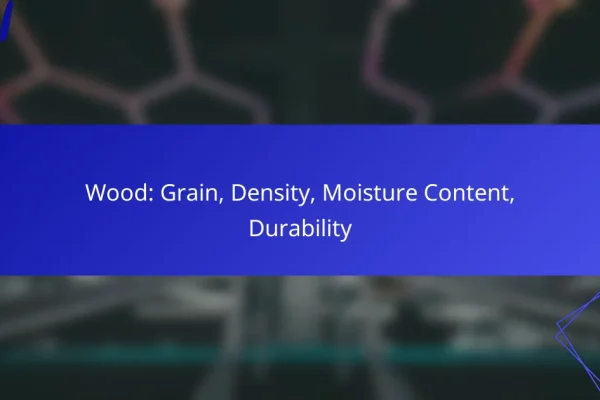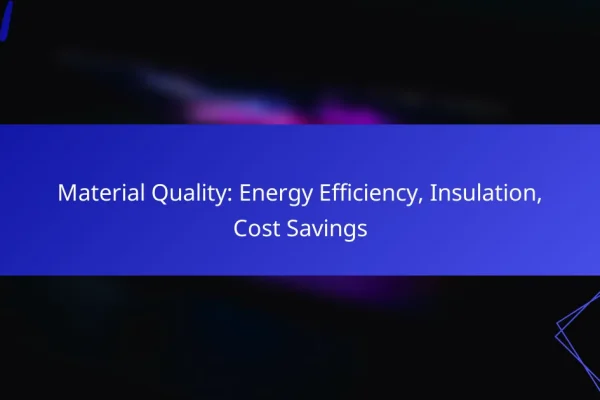What are the best home improvement materials for durability?
The best home improvement materials for durability include composite decking, engineered hardwood, metal roofing, fiberglass insulation, and stone veneer. These materials are known for their long-lasting performance and resistance to various environmental factors.
Composite decking
Composite decking is made from a blend of wood fibers and plastic, offering a durable alternative to traditional wood decking. It resists rot, splintering, and fading, making it ideal for outdoor use. When selecting composite decking, look for products with a high percentage of recycled materials and a warranty of at least 25 years.
Consider the color and texture options available, as they can mimic the appearance of natural wood while providing superior longevity. Regular cleaning with soap and water can help maintain its appearance over time.
Engineered hardwood
Engineered hardwood consists of a thin layer of real wood on top of a plywood base, providing the aesthetic of solid wood with enhanced stability. This material is less prone to warping and can be used in areas with fluctuating humidity levels. Look for options with a wear layer of at least 3mm for better durability.
Installation can be done via floating, glue-down, or nail-down methods, depending on your subfloor. Regular maintenance includes cleaning with a damp mop and avoiding excessive water exposure.
Metal roofing
Metal roofing is known for its exceptional durability, often lasting 40 years or more with proper maintenance. It is resistant to extreme weather conditions, including high winds and heavy snowfall. When choosing metal roofing, consider materials like steel or aluminum, which offer good longevity and energy efficiency.
Installation should be performed by professionals to ensure proper sealing and insulation. Regular inspections can help identify any potential issues, such as rust or loose panels, before they become significant problems.
Fiberglass insulation
Fiberglass insulation is a popular choice for its excellent thermal performance and fire resistance. It can significantly reduce energy costs by keeping homes warmer in winter and cooler in summer. When selecting fiberglass insulation, look for products with a high R-value, which indicates better insulating properties.
Installation should be done carefully to avoid gaps, as these can reduce effectiveness. Wearing protective gear during installation is essential to avoid skin irritation from the fiberglass particles.
Stone veneer
Stone veneer is a lightweight alternative to natural stone, providing a durable and attractive exterior finish. It is resistant to moisture and pests, making it suitable for various climates. When choosing stone veneer, consider options that meet local building codes for fire resistance and insulation properties.
Proper installation is crucial for durability; ensure that it is applied over a suitable substrate and with appropriate adhesives. Regular cleaning can help maintain its appearance and prevent the buildup of dirt and algae.
How to choose quality home improvement products?
Choosing quality home improvement products involves evaluating materials, manufacturer reputation, and warranty options. Prioritizing these factors ensures durability, safety, and value for your investment.
Assess material certifications
Material certifications indicate that products meet specific industry standards for safety and performance. Look for certifications such as ASTM, ISO, or local equivalents that ensure the materials used are reliable and tested.
For example, if you’re purchasing flooring, check for certifications that confirm it is low in volatile organic compounds (VOCs) to ensure better indoor air quality. Always ask for documentation to verify these claims.
Evaluate manufacturer reputation
A manufacturer’s reputation can significantly impact the quality of home improvement products. Research online reviews, ratings, and testimonials from previous customers to gauge their experiences with the brand.
Additionally, consider how long the manufacturer has been in business. Established companies often have a track record of quality and customer service, which can provide peace of mind when making a purchase.
Consider warranty options
Warranties are crucial when selecting home improvement products as they protect your investment against defects and failures. Look for products that offer comprehensive warranties that cover both materials and workmanship.
Common warranty lengths range from one year to a lifetime, depending on the product. Be cautious of products with limited warranties, as they may indicate lower quality or confidence in the product’s durability.
What are the top brands for home improvement materials?
The leading brands for home improvement materials are recognized for their quality, durability, and innovation. Homeowners and contractors often choose these brands based on their reputation and the specific needs of their projects.
GAF for roofing
GAF is a prominent brand in the roofing industry, known for its high-quality shingles and roofing systems. Their products are designed to withstand various weather conditions, making them a reliable choice for homeowners.
When selecting GAF roofing materials, consider the warranty options, which can range from limited lifetime to 50 years. This can provide peace of mind regarding long-term performance.
Andersen for windows
Andersen is a leading manufacturer of windows, offering a variety of styles and materials, including wood, vinyl, and composite options. Their windows are designed for energy efficiency and aesthetic appeal, making them a popular choice for renovations.
Look for Andersen windows that meet ENERGY STAR standards to ensure optimal insulation and energy savings. Their products often come with extensive warranties, enhancing their value over time.
Moen for plumbing fixtures
Moen is well-known for its plumbing fixtures, including faucets and showerheads, which combine functionality with modern design. Their products are engineered for durability and ease of use, making them a favorite among homeowners.
When choosing Moen fixtures, consider features like water efficiency ratings and ease of installation. Many models come with a lifetime warranty, reflecting the brand’s commitment to quality.
Behr for paints
Behr is a top choice for paints and coatings, offering a wide range of colors and finishes suitable for both interior and exterior applications. Their products are known for excellent coverage and durability.
For best results, select Behr paints that are specifically formulated for the surface you are painting, whether it be drywall, wood, or metal. Look for low-VOC options to ensure better indoor air quality during and after application.
How do material costs affect home improvement projects?
Material costs significantly influence home improvement projects by determining the overall budget and quality of the final outcome. Higher-quality materials often come with increased costs, which can impact both the immediate financial outlay and long-term value of the investment.
Impact on overall budget
The overall budget for a home improvement project is directly affected by the choice of materials. For instance, opting for premium flooring or energy-efficient windows can substantially raise initial costs, often by 20-50% compared to standard options. Homeowners should carefully assess their budget to ensure they can accommodate these expenses without compromising other project aspects.
To manage costs effectively, consider prioritizing essential materials first and exploring alternatives that offer a balance between quality and price. For example, engineered wood may provide a similar aesthetic to solid hardwood at a lower price point.
Long-term value considerations
Investing in higher-quality materials can enhance the long-term value of a home. Durable materials tend to require less maintenance and replacement, which can save homeowners money over time. For example, using high-grade roofing materials may cost more upfront but can extend the lifespan of the roof by several years compared to cheaper options.
Additionally, certain materials can improve energy efficiency, leading to lower utility bills. For instance, insulated windows may have a higher initial cost but can result in significant savings on heating and cooling over the years, making them a worthwhile investment.
What are the environmental impacts of home improvement materials?
The environmental impacts of home improvement materials can be significant, affecting ecosystems and human health. Factors such as resource extraction, manufacturing processes, and disposal methods contribute to pollution, waste, and habitat destruction.
Sustainable sourcing
Sustainable sourcing refers to obtaining materials in a way that minimizes environmental damage and supports social responsibility. This practice often involves using renewable resources, reducing carbon footprints, and ensuring fair labor practices throughout the supply chain.
When selecting home improvement products, look for certifications such as Forest Stewardship Council (FSC) for wood or Energy Star for appliances. These labels indicate that the materials were sourced responsibly and meet specific environmental standards.
Consider the lifecycle of materials, including their production, usage, and end-of-life disposal. Opting for locally sourced materials can reduce transportation emissions and support the local economy, making it a practical choice for environmentally conscious homeowners.












